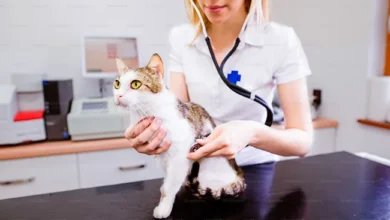
A pet insurance policy is often a sort of insurance (quite similar to health insurance for humans) that assists pet owners in meeting the costs associated with caring for their animal companions. For instance, it can help pay for veterinary fees, medication, and other expenses. You can select the best cheap pet insurance policy that caters to your requirements the most effectively due to the availability of multiple options.

Pet insurance premiums are determined by a number of factors, including your pet’s age, breed, and medical history. If your pet requires medical treatment, you will be responsible for either a copayment or a deductible. As soon as this process is completed, the insurance company will reimburse you for the outstanding expenditures.
Read More:
- What Is Pet Insurance? How to Buy Good Insurance for Your Pets?
- The Average Cost of Pet Insurance: A Basic Guide
- What is Pet Insurance and Why You Need One
- Laser Therapy on Dogs_ The Science, Uses, and Benefits
- The 7 Things You Need to Ask When you get pet insurance
What Kinds Of Coverage Are There To Choose From?
There are several distinct policies to choose from when shopping for insurance for your pet. Comprehensive plan coverage is the most popular type of plan coverage. It helps cover various medical expenses, including exam fees, vet visits, emergency care, illness, and accident coverage. As the name suggests, other plans solely cover accidents are known as accident-only plans. Some comprehensive plans also include wellness coverage, which contributes to the payment of preventative medical services such as checkups and vaccines.
Insurance for Rehabilitative Purposes
Rehabilitation coverage can assist with covering the costs of several types of rehabilitation, including physical therapy, hydrotherapy, and others. When treating pets that have been injured or are coping with a chronic condition, this may be an ideal choice.
Protection for Urgent Medical Needs
The unexpected costs of veterinary care, such as those incurred if your pet needs surgery or gets involved in an accident, can be covered by emergency care insurance. In most cases, the deductible for this kind of coverage is significantly larger than that of comprehensive policies.
Insurance for Hospital Stays and Surgical Procedures
The coverage for hospitalization and surgery helps to pay for the costs of your pet to stay in the animal hospital and any necessary surgeries that you may require. In most cases, the deductible for this kind of coverage is significantly larger than that of comprehensive policies.
Insurance Coverage for Specialist Care
Coverage for specialist treatment contributes toward paying the costs associated with seeing a specialist, such as a cardiologist or an oncologist. In most cases, the deductible for this kind of coverage is significantly larger than that of comprehensive policies.
Insurance Coverage for Diagnostic Tests
Having coverage for diagnostic testing can assist with the financial burden of paying for X-rays, MRIs, and other types of diagnostic procedures. In most cases, the deductible for this kind of coverage is significantly larger than that of comprehensive policies.
Insurance for Medications on Prescription
Your pet’s prescription meds can be more easily paid for with the assistance of prescription drug coverage. Additionally, the deductible for this kind of coverage is often lower than the deductible for comprehensive policies.
What are the advantages of purchasing a policy for pet insurance?
The benefits of having medical insurance coverage for your pet are having peace of mind and being financially protected if your pet gets sick or injured. You will have the peace of mind that comes with knowing that your pet is covered, and you will be able to choose the degree of coverage most appropriate for your requirements and your finances, thanks to insurance.
Coverage for dental Illnesses and Accidents
Dental sickness or injury is one of the types of claims that pet owners most frequently file with their insurance carriers. Dental coverage assists in providing reimbursement for the costs of dental treatment for your pet, which may include cleaning, x-rays, and other procedures.
There are disorders that are unique to a Breed, Congenital, and Inherited. Many breeds of dogs and cats are predisposed to developing certain health conditions. Boxers and Golden Retrievers, for instance, have an increased risk of developing hip dysplasia, and Boxers also have an increased risk of developing cancer. Several insurance firms provide coverage for these breed-specific ailments. In addition, many pet insurance plans cover inherited or congenital illnesses.
Insurance Coverage for Cancer Treatment
Regarding animals, cancer is one of the most common causes of death. Your pet’s cancer treatment, which may include chemotherapy, radiation therapy, and other procedures, may be covered in part or in full by the insurance policy you have on your pet.
Ongoing conditions
A chronic condition occurs repeatedly or lasts for an extended period. Diseases such as diabetes, arthritis, and others can fall under this category. The most acceptable pet insurance policies typically provide coverage for ongoing needs.
Conditions that you can prevent
Getting immunizations and treating your pet for fleas and ticks will help prevent entirely avoidable diseases. In addition, some pet plans cover preventable conditions.
Conditions Relating to Orthopedics
Conditions that affect the bones or joints are referred to as orthopedic conditions. Conditions such as hip dysplasia, elbow dysplasia, and others can fall under this category. Many pet insurance plans cover orthopedic issues.
How to choose the Right Insurance Policy?
When looking for the most acceptable pet insurance plan, you should consider a few considerations. First and foremost, you should consider the kind of protection you require. For instance, if your pet is generally healthy and is not anticipated to require significant medical attention, you probably do not need complete coverage. On the other hand, purchasing a plan that covers a broader range of potential scenarios could be beneficial if your pet has health issues or is prone to mishaps.
When choosing an insurance plan, you also need to consider your finances. For instance, pet insurance coverage can be rather pricey, so you’ll want to check that you have enough money set aside each month to cover the payment. In addition, you need to consider the copay or deductible and ensure that you are okay with it.
Insurance won’t cover care costs even if your pet is already sick or damaged. Companies have waiting periods before coverage begins, and any conditions before your policy enrollment will be excluded.



